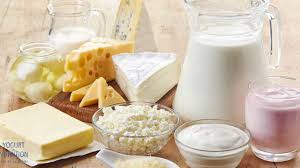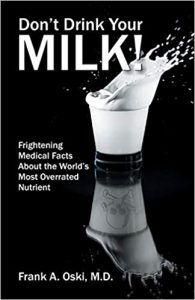
The time has come for us to discover the real truth about milk and milk products despite the great efforts of the dairy lobbies. And the truth is exactly the opposite. Namely, new studies and evidence from distinguished doctors and researchers from prestigious institutes and agencies prove the opposite, stating that consumption of cow's milk and dairy products causes dozens of diseases in children and adults.
Now most milk consumers are completely confused and will logically answer: "But our grandmothers grew up on cow's milk!" In this claim, they forget that the milk that our grandmothers drank every morning from the only cow they had that grazed on a clean lawn has nothing to do with industrial milk or dairy products that are mass-produced today and are offered on store shelves, but also that our grandmothers didn't know about cow's milk intolerance, or they didn't even have a choice...
Therefore, it is not a bad idea to consider some of the reasons why it is good to give up milk consumption and read arguments based on scientific evidence, which you have not thought about at all.
Therefore…

Cow's milk contributes to this condition in two ways: it contains extremely little iron; however, a diet with too little iron causes gastrointestinal bleeding and digestive problems, which causes loss of plasma and red blood cells, causing anemia. Mucus created by dairy products causes asthma, respiratory problems, sinusitis and constipation.
Many other scientists also claim that dairy products are simply not good for humans. Milk is a factor that causes constipation, chronic fatigue, arthritis, headache, muscle cramps, obesity, atherosclerosis and heart problems. A well-known pediatrician in Washington says that eliminating dairy products from the diet would do the most for human health.
Gynecologists, including the celebrated Dr. Christiane Northrup from Yarmouth, states that dairy products cause hormone imbalances, women's problems, weight and thyroid problems, and problems with digestion, the respiratory system and excess mucus, causing both a weakened immune system and a significantly greater susceptibility to disease.

Regular consumption of dairy products is associated with prostate cancer. Dairy products are also associated with an increased risk of lung cancer, breast cancer, and ovarian cancer in people with lactose intolerance.
Man is the only creature that drinks milk after he stops nursing his mother, and that milk from another animal. You should know that the chemical composition of human milk is very different from cow's milk. The composition of human milk is adapted to the needs of the infant: it contains everything the child needs for healthy growth and development, and is completely different from what the calf needs. And when people lose their natural need for milk, the production of enzymes for milk metabolism begins to decrease, as well as those for processing protein and lactose.

In addition to the difference in protein levels in these two different types of milk, there are also significant differences in the composition of these proteins. The primary protein in cow's milk is casein. Cow's milk has 20 times more casein than breast milk, so cow's milk protein is difficult for humans to absorb and digest.
Proponents of milk mostly emphasize the importance of calcium in milk, but Dr. William Ellis, from Philadelphia Osteopathic College, explains that people who drink milk every day have the lowest calcium levels in their blood. He adds that a low level of calcium in the blood causes irritability, headaches and muscle cramps.
One of the most serious problems caused by calcium deficiency is osteoporosis, which affects 25 percent of 65-year-old women. Their bones become brittle and brittle. Aggressive advertisements of the dairy industry emphasize that large quantities of milk will ensure strong and healthy bones, and scientists reply that although milk has a lot of calcium, the absorption of calcium in the body is much lower because most of the minerals are consumed by the body to neutralize acidity and not to absorb calcium. Improper nutrition causes body acidity (candida - flatulence, digestive problems...), and in order to neutralize it, the body extracts minerals from the bones because there are not enough of them in the diet, and the result is osteoporosis. The reason for bone problems is not a lack of calcium, but other vitamins and minerals without which calcium cannot be successfully bound.
Without silicon, vitamin K, vitamin D, zinc, boron, magnesium and others, sufficient calcium cannot help you. Also, most calcium pills do more harm than good. Our body cannot use this calcium because it is mostly inorganic and instead of strengthening our bones, it is deposited on them like limestone. It is similar with other inorganic compounds, which include many synthetic preparations obtained in the form of effervescent tablets or calcium that are added to milk, juices and other products.

Experts from the Physicians Committee for Responsible Medicine (PCRM) point to a 12-year study by Harvard University, in which 78,000 women participated, which showed that women who drank milk three times a day had more frequent bone fractures than those who drank it rarely. . A 1994 study of elderly people in the Australian city of Sydney concluded that higher consumption of dairy products was associated with an increased risk of fractures. Calcium is important for bone protection, but it is also important to keep it in the bones. While 32 percent of calcium is absorbed from dairy products, 50 to 60 percent of calcium is absorbed from kale, broccoli and Brussels sprouts. Calcium-rich plant foods also contain nutrients that are important in the fight against cancer.
Intolerance of the milk sugar lactose causes flatulence, abdominal pain and cramps, diarrhea and nausea. Studies have shown that, as a result of consuming milk and dairy products, allergies, increased risk for cardiovascular and cerebrovascular diseases and malignant diseases (prostate, rectal and breast cancer; leukemia...), asthma, juvenile diabetes, sinus congestion, ear infections also occur. , resistance to antibiotics...
The consumption of milk and milk products also promotes many diseases associated with the intensive and merciless breeding of cows in the dairy industry. Most of the dairy products we buy also contain allergens, fats, cholesterol, herbicides, pesticides, dioxins, antibiotics, blood, pus as a result of udder inflammation, bacteria and viruses.
Cow's milk is indeed "perfect natural food", but for calves and not for humans. Therefore, it is important to teach children from an early age that for healthy bones they need a lot of movement, sun and calcium, but not milk. Schools should encourage children to eat as many vegetables as possible, from which they will get not only calcium but also other useful substances, important for healthy growth and development. Children also deserve information that plant-based sources of calcium are healthier, such as green leafy vegetables, tofu, legumes, dried fruit, seeds, soy products, and calcium-fortified drinks.
Source: Free Dalmatia




